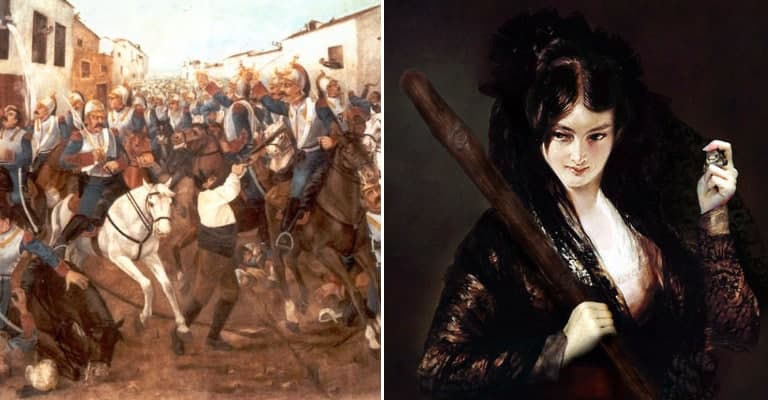In 1807, the peninsula war began when the French armies of Napoleon and their Spanish allies invaded the Kingdom of Portugal. Spain quickly found itself the victim instead of the victor of the ill-fated endeavor when France turned against its former allies, taking over Spain’s territory and throne. However, the people of Spain did not take this invasion lightly and so began seven years of guerrilla warfare as Spanish insurgents took up the fight of the army, wearing down French resistance with their relentless, sporadic attacks.
These guerrilla fighters included otherwise ordinary men such as former farmer Francisco Espoz y Mina, lawyer, Joaquín Ibáñez, Baron de Eroles and Francisco de Longa, a blacksmith. They and many others took up arms after the French invasion. However, not everyone who resisted the French took to the hills. For in June 1808, one small town in La Mancha launched an unprecedented resistance of its own under the leadership of a twenty-year-old barmaid, Juana Galan.

Spain and the Peninsula war
In autumn 1807, Napoleon Bonaparte invaded Portugal, marking the start of the seven-year Peninsula war. Portugal was one of the staunchest allies of Britain and Napoleon wanted to curtail Portuguese military support to France’s old enemy. In the wake of his defeat at the battle of Trafalgar in 1805, Bonaparte was particularly concerned about the use of Portugal’s ports as safe havens by British ships- and the possibility of British use of the Portuguese navy. So he attempted to force Portugal to declare war on Britain. When Portugal refused, Napoleon and his Spanish allies invaded.
However, Napoleon had doubts about the staunchness of his Spanish allies. Spanish support of the French cause was becoming shaky -especially in the wake of Trafalgar. Civil unrest amongst the people of Spain and the weak rule of Charles IV was also destabilizing the Franco-Spanish alliance. In March 1808, the situation became critical when Charles was forced to abdicate, and his son Ferdinand took the throne. Napoleon had already decided that he would replace Charles with his brother, Joseph to ensure tighter control of the Spanish forces. Charles’ abdication expedited matters, and so Napoleon’s troops removed the hapless Ferdinand, placing Spain effectively under direct French rule.
However, the people of Spain did not take this attack on their sovereignty lightly. On May 2, 1808, the city of Madrid rebelled outright against the occupying French forces, leading to the massacre of hundreds of people by French troops. However, the uprisings spread. Cartagena and Valencia rebelled on May 23, followed by Zaragoza and Murcia on May 24 and Asturias on May 25. Further pockets of localized, spontaneous resistance also began to break out. Known as “little wars” or Guerrillas” in Spanish, these outlaw bands included former Spanish soldiers- and ordinary men and women.

The French met this resistance with a series of brutal reprisals. When in early 1809, the villagers of Arenas killed German mercenaries in the pay of the French army, the French retaliated by wiping the whole village out, raping women and killing children. Even before the events in Arenas, the sacking of churches, massacres in the street and the execution of those suspected of harboring guerilla fighters had become commonplace. Spain was no longer a partner in the Peninsula campaign- it was one of its victims.
However, such horrific incidents did little to quell Spanish resistance. Indeed, it only seemed to fuel it. So it is little wonder that when French troops finally reached the small town of Valdepenas in the province of La Mancha in June 1808 that they met with fierce resistance from the locals under the leadership of one local woman, Juana Galan.

